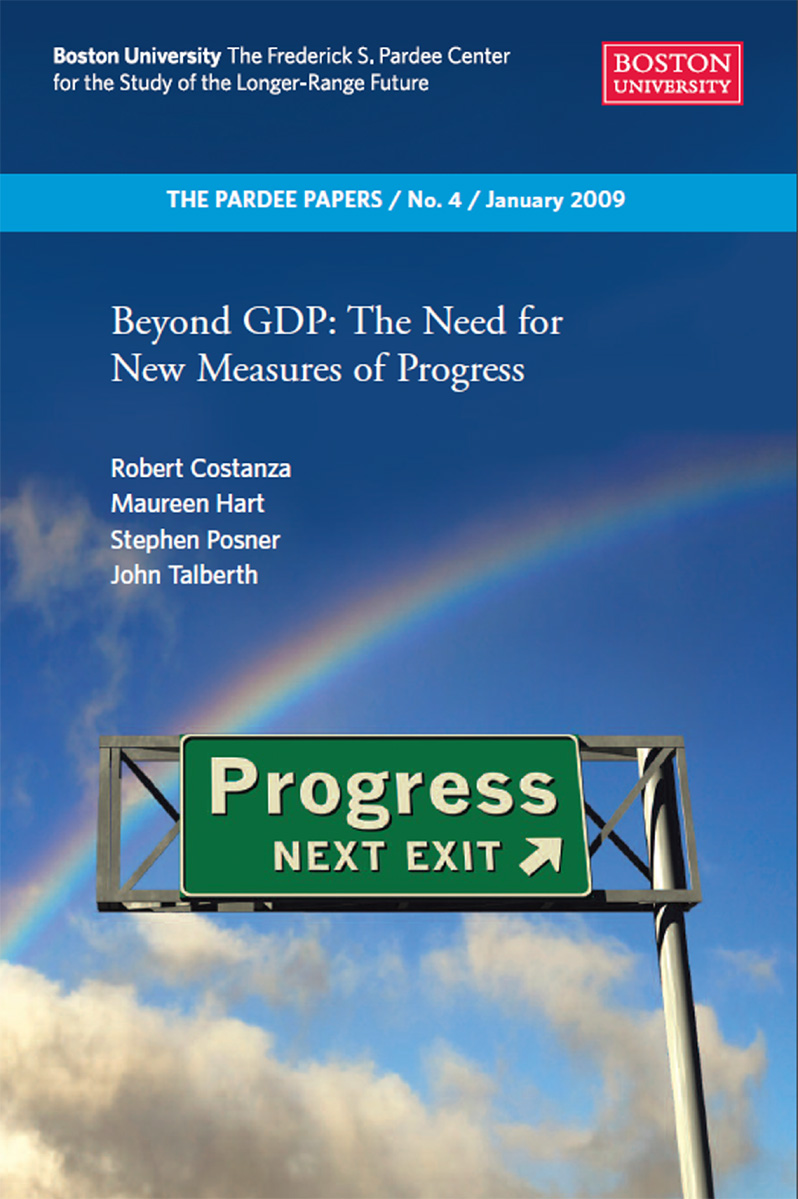The Pardee Papers, No. 4, January 2009
 Beyond GDP: The Need for New Measures of Progress
Beyond GDP: The Need for New Measures of Progress
By Robert Costanza, Maureen Hart, Stephen Posner, and John Talberth
January 2009 (46 pages)
Download PDF
This paper is a call for better indicators of human well-being in nations around the world. We critique the inappropriate use of Gross Domestic Product (GDP) as a measure of national well-being, something for which it was never designed. We also question the idea that economic growth is always synonymous with improved well-being. Useful measures of progress and well-being must be measures of the degree to which society’s goals (i.e., to sustainably provide basic human needs for food, shelter, freedom, participation, etc.) are met, rather than measures of the mere volume of marketed economic activity, which is only one means to that end. Various alternatives and complements to GDP are discussed in terms of their motives, objectives, and limitations. Some of these are revised measures of economic activity while others measure changes in community capital—natural, social, human, and built—in an attempt to measure the extent to which development is using up the principle of community capital rather than living off its interest. We conclude that much useful work has been done; many of the alternative indicators have been used successfully in various levels of community planning. But the continued misuse of GDP as a measure of well-being necessitates an immediate, aggressive, and ongoing campaign to change the indicators that decision makers are using to guide policies and evaluate progress. We need indicators that promote truly sustainable development—development that improves the quality of human life while living within the carrying capacity of the supporting ecosystems. We end with a call for consensus on appropriate new measures of progress toward this new social goal.
Robert Costanza is University Professor of Sustainability and Director, Institute for Sustainable Solutions at Portland State University in Portland, Oregon. He is well-known for transdisciplinary research that integrates the study of humans and the rest of nature to address research, policy, and management issues at multiple scales, from small watersheds to the global system. He is co-founder and past-president of the International Society for Ecological Economics, and was founding chief editor of the society’s journal, Ecological Economics. His awards include a Kellogg National Fellowship, the Society for Conservation Biology Distinguished Achievement Award, and a Pew Scholarship in Conservation and the Environment.
Maureen Hart, president of Sustainable Measures Inc., is an expert on sustainability indicators and the author of the Guide to Sustainable Community Indicators. She has provided technical assistance to community indicator projects, evaluated indicators and indicator sets, and researched, published, and presented various aspects of measuring sustainability. She has consulted with businesses and business-related non-profits on sustainable production indicators and has developed a course on business sustainability indicators as an affiliate of the Lowell Center for Sustainable Production. She co-founded and directed the International Sustainability Indicators Network (ISIN), a non-profit network of sustainability indicator practitioners and experts.
Stephen Posner is an independent environmental and economics consultant who focuses on sustainability indicators and ecosystem service valuation. He was an Energy Fellow at the University of Vermont Office of Sustainability and a research assistant at the Gund Institute for Ecological Economics. His research has focused on institutional climate and energy planning, alternative approaches to environmental accounting, and the economic value of risks and opportunities arising from how businesses depend on ecosystems.
John Talberth serves as Senior Economist with the People and Ecosystem Program at the World Resources Institute, providing economic analysis for its Southern Forests for the Future, Mainstreaming Ecosystem Services, and Chesapeake Bay projects. He previously was Director of the Sustainability Indicators Program at Redefining Progress, and concurrently President and Senior Economist with the Center for Sustainable Economy (CSE). Prior to his work with CSE, Talberth led several grassroots and national campaigns to protect public forests throughout the United States. His current research interests include economic localization, ecosystem services and the law, alternatives to GDP, and sustainability indicators.